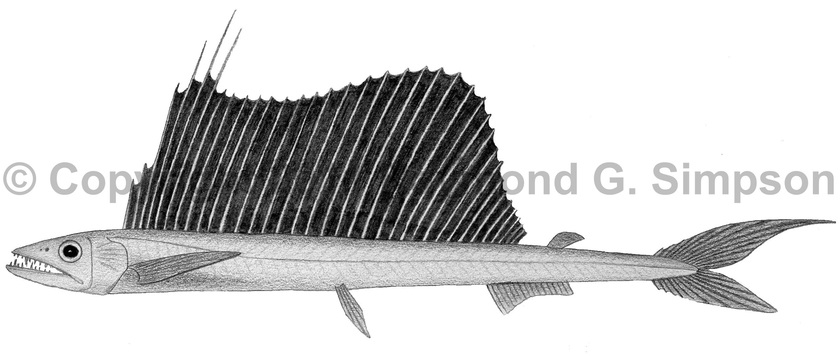
Common Name
Longnose Lancetfish
Year Described
Lowe, 1833
Identification
Dorsal Fin: 36-45
Anal Fin: 14-18
Pelvic Fin: 8-10
Pectoral Fin: 12-15
Body very elongate, slender, and compressed. Head long (16-23% SL). Snout long and pointed (33-50% HL). Jaws with strong teeth. Dorsal fin very high and sail-like, depressable along dorsal midline. Anterior of dorsal fin highest, with several rays filamentous. Dorsal fin origin immediately above pectoral fin or slightly behind it. Adipose fin present. Anal fin small and low; inserted under rearmost dorsal fin rays. Pectoral fin ventrally inserted. Pelvic fins short at midbody. Caudal peduncle with lateral adipose keel. No scales on body.
Color
Dark brown to black above, becoming silvery white below, often with an iridescent sheen. Dorsal fin black to blue-black with no markings. Other fins dark.
Size
Maximum size to 200cm SL.
Habitat
Epipelagic to mesopelagic from 0-1000m.
Range
Canada to the Caribbean Sea, including the Gulf of Mexico.
References
Froese, R. and D. Pauly. Editors. 2012.FishBase. World Wide Web electronic publication. www.fishbase.org, version (08/2012).
McEachran, J.D. and J.D. Fechhelm. 1998. Fishes of the Gulf of Mexico. Volume 1: Myxiniformes to Gasterosteiformes. University of Texas Press, Austin. i-viii + 1-1112.
Thompson, B.A. 2002. Alepisauridae (pp. 940). In: Carpenter. 2002. The living marine resources of the Western Central Atlantic. Vol. 2: Bony fishes part 1 (Acipenseridae to Grammatidae). FAO Species Identification Guides for Fisheries Purposes. American Society of Ichthyologists and Herpetologists Special Publication No. 5. FAO of the U.N., Rome.